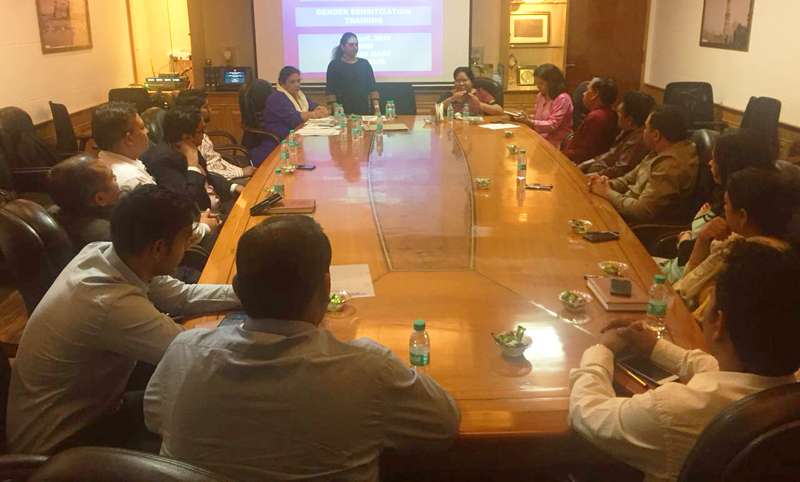On 12th April, 2018, Gender Training Institute held gender sensitization training with the working staff of Securities and Exchange Board of India (SEBI). These trainings were offered in conjunction with legal awareness about sexual harassment.
All government institutions are mandated to constitute an ‘Internal Complaints Committee’ which addresses and provides redress to cases of sexual harassment at the workplace. Dr. Manasi Mishra, from Centre for Social Research is the NGO member (a presiding NGO member is also mandatory) of SEBI’s ICC. She was accompanied by Ms. Kamlesh Premi, counselor of sexual harassment and domestic violence, Ms. Rashmi Mishra and Ms. Ayurshi Dutt.
.@CSR_India at @SEBI_India for a comprehensive #training on tackling issues of #SexualHarassment @manasimishra333 @rashmimishra08 @ranjanakumari @AyurshiD pic.twitter.com/Ny5XQBwY5M
— Gender Training Institute (@GenderTrainings) April 12, 2018
The training comprised of detailed discussion about the distinction between the biological concept of ‘sex’ and sociological concept of ‘gender’. Predominantly, the participants had a decent prior understanding of these terms, and were able to clearly differentiate between gender-based roles and responsibilities. To elucidate, these trainings broke the murky assumptions about women’s role, nature and characteristics in the society by giving examples like- “Menstruation is a biological characteristic of women” and “Women do all the household work”. The participants were quick to disprove these stereotypes, and emerged as a set of gender aware people. Subsequently, we shed light on the notion of paternity leaves, with the underlying idea that taking care of a child is not solely the responsibility of a mother; a father plays an equally important role. It was refreshing to know that SEBI provides paternity leaves of 15 days to its male employees. The widely recognized UN documentary ‘The Impossible Dream’ was also showcased, which demonstrated the drudgery of household labour, and disseminated the idea that women do household chores which go unrecognized and are taken for granted.
Wait, are women more loving and caring, or is it the vice-versa? Hear from our participants at @SEBI_India #GenderStereotypes #GenderMyths @rashmimishra08 @manasimishra333 @AyurshiD pic.twitter.com/tZyGOFv7AD
— Gender Training Institute (@GenderTrainings) April 12, 2018
Next, we played the ‘bottle game’ where a participant was asked to carefully cross over a few bottles laid on the ground, without making them fall, and the catch was to do it blindfolded. As the blindfold is actually put on, all the bottles were removed and the participant was seen stifling the ‘bottles’, which indicated a message- our social conditioning makes us very susceptible to our actions. We also conducted two pertinent activities with these participants. The first one comprised of a list of roles, such as tailor, driver, manager, etc, and asked the participants to tell whether they saw women or men in these roles. While it was noteworthy the participants saw men and women both donning these hats, there were two striking observations. First, the number of participants voting for ‘only male’ was more than ‘both’ for the role of a priest, and secondly, number of participants voting for ‘only female’ was less than ‘both’ for the role of driver. This brief analysis led to a jocular moment where the participants implied that women are slow drivers, and are extra cautious on the road, thus showing the presence of another stereotype. For the last activity, participants were handed out sheets of paper with boxes, and were asked to write anything. It was noted that majority of participants drew/wrote within the box, and very few stepped out of the box, showing the level of social conditioning ingrained in their mind, either advertently or inadvertently.
What do our participants at @SEBI_India think of #SexualHarassment. Join in for a lively debate @manasimishra333 @rashmimishra08 @AyurshiD pic.twitter.com/hWaDChfoX4
— Gender Training Institute (@GenderTrainings) April 12, 2018
Finally, the topic of sexual harassment as workplace was discussed, and it was encouraging to know that most participants were aware of the workings of the ICC committee. However, they steered the discussion in a very informed way as they raised questions about what constitutes as sexual harassment at workplace, to which Ms. Kamlesh Premi responded that even if unsolicited incidents happen on her way to/from work, it will be constituted as sexual harassment. The staff at SEBI later asked what are the best strategies to de-stigmatize the victim, and also the accused. Our trainers also catered to question of what are the redressal procedures if a man is sexually harassed at the workplace, and how to deflect the hierarchy so as to seek justice.
Sex and #gender often used interchangeably. Let’s break these conceptual barriers. Watch our trainers live #GenderTraining #SexualHarassment #GenderMyths #BreakingStereotypes @rashmimishra08 pic.twitter.com/H7vTGJlgKK
— Gender Training Institute (@GenderTrainings) April 12, 2018





